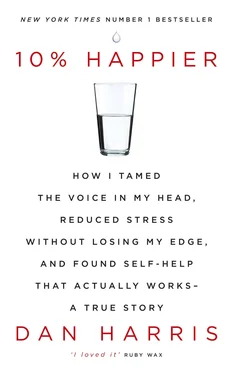So was he full of shit? I couldn’t tell. As with Tolle, I found him to be a baffling mixtape of the interesting and the incomprehensible—like a DJ toggling between the Rolling Stones and Rick Astley, the Band and Dokken. I liked it when he said things like, “The fact that you exist is a highly statistically improbable event, and if you are not perpetually surprised by the fact that you exist you don’t deserve to be here.” But too often, he reverted to a seemingly involuntary, impenetrable spiritual patois that had a certain je ne sais pas pourquoi . His memorable assertions to me included “The universe is a nanotechnology workshop in the mind of god,” and “Don’t call it God, call it a-causal, non-local, quantum-mechanical inter-religiousness.”
Chopra was infinitely more fun to hang out with than Tolle—I preferred Deepak’s rascally What Makes Sammy Run? style to the German’s otherworldly diffidence—but I left the experience more confused, not less. It was intriguing that someone could strive so nakedly and yet claim to be without stress. That would have answered many of my questions about defeating the ego without killing your edge—if only I believed him.
My next move was motivated by sheer desperation. It was mercifully brief, but unrelentingly absurd. Felicia and I decided to launch a whole series of stories on self-help for Sunday World News . We called it “Happiness, Inc.” The idea was to delve into an unregulated, $11 billion industry that had attracted a growing number of followers as Americans moved away from organized religion. With no answers forthcoming from Tolle or Chopra, this was the only thing I could think to do. What I found in this distinctly American subculture was beyond crazy—a parade of the unctuous and the unqualified, preaching to the desperate and, often, destitute.
One of the leading players in this questionable game was Joe Vitale, who had risen to prominence after landing a cameo in what would become a monster cultural phenomenon called The Secret . This was a high-gloss book and DVD that came out in 2006 and featured a whole crew of self-help gurus expounding on the “Law of Attraction,” which offered the prospect of getting anything you wanted—health, wealth, love—simply by thinking about it in the right way. It was essentially a slick repackaging of an old idea that had been sent up the flagpole by such pioneering turkeys as Napoleon Hill, who produced the 1930s bestseller Think and Grow Rich , and Norman Vincent Peale, author of the canonical turd, The Power of Positive Thinking .
As I slid into the backseat of Vitale’s Rolls-Royce, it truly hit home to me how far Deepak was on the benign end of the self-help spectrum. Vitale had a doughy face and a large, hairless head, which gave the impression of a vastly overgrown baby. He was giving my crew and me a free taste of what would normally cost $5,000: something he called the “Rolls-Royce Phantom Mastermind” session. As his driver squired us through the Texas countryside, Vitale explained that people paid to come to his home in exurban Austin and take a ride with him, during which he helped them “mastermind ideas that change lives.”
With the camera pointing back at us from the front seat, I said, “This is an amazing car, but five grand is a lot for three hours with you.”
“Well, there are people who think I should charge a lot more than that. They think that’s giving it away.”
The Rolls was just one of many sources of income for “Dr.” Vitale. Homeless just thirty years ago, Vitale had earned his PhD in “metaphysics” through a correspondence course from the University of Sedona. He now lived in a large house with many cars, purchased with the proceeds from dozens of books, with titles like Expect Miracles and Attract Money Now . He also sold products like margarita mix, a health drink called YouthJuice, and stickers with pictures of Russian dolls on them that, for reasons I couldn’t quite understand, Vitale insisted would help the owner meet his or her life goals. (List price: $39.)
In an interview in Vitale’s home office, I asked, “You never wake up in the middle of the night thinking, ‘I can’t believe I’m getting away with this’?”
“No, never,” he said, laughing as if this were the last thing that would have ever occurred to him.
While, in theory, I could see the appeal of positive thinking—especially as a man who unquestionably spent too much time ruminating—when I scratched the surface of this “philosophy,” I quickly encountered gale force inanity. On the DVD version of The Secret , Vitale pops on-screen to utter such memorable chestnuts as “You are the Michelangelo of your own life. The David that you are sculpting is you—and you do it with your own thoughts.” Under questioning in our interview, though, Vitale admitted that it was not that easy. In fact, he folded like a cheap lawn chair.
“So, what if I want a diamond necklace for my wife?” I asked. “Can I get that by thinking about it?”
“Not just by thinking about it. That’s one of the biggest misconceptions of all time. You have to take action. It’s not just thinking—it’s thinking coupled with action.”
“Isn’t that a statement of the glaringly obvious? You think it’s news to most people that if you want something you have to try to get it?”
“You know, when you put it that way, it sounds silly,” he said, laughing sheepishly. “Pretty brainless.”
The more worrisome message of The Secret phenomenon was not the preposterousness of its primary sales pitch, but instead its destructive undercurrent. “The inverse of your logic,” I argued to Vitale, “seems to blame the victim. Because if you aren’t getting what you want, it must be your fault.”
“This is not a blame game,” he insisted. “Our unconscious thoughts is [ sic ] what’s creating our reality—and many of our unconscious thoughts are not very positive; they are negative. They actually attract problems.”
So this would be true of kids with cancer? Victims of genocide? “It strains credulity,” I said, “to say that everybody who got hit by the earthquake in Haiti had some unconscious thinking going on that led to them being victims.”
“None of those people are being victimized. In other words—”
“In an earthquake, you’re victimized, aren’t you?”
An awkward pause. A stutter. And then he conceded, “In an earthquake you’re victimized.”
The other star of The Secret I covered managed to push the absurdity level directly into the truly dangerous range. James Arthur Ray was a fit, fifty-something, divorced junior college dropout who oozed smarmy overconfidence. An oily character, he looked like he always had a thin sheen of sweat covering his face. He promised his followers that he could help them achieve “harmonic wealth” in all areas of their life. He claimed that, using his own techniques, he’d not only gotten rich, but that he also no longer so much as caught a cold.
There was clearly some sort of error in his thinking, however, because in October of 2009, at a “Spiritual Warrior Retreat” in Arizona, which cost nearly ten grand per person, three of Ray’s followers died in a sweat lodge ceremony over which he personally presided. It was an imitation of a Native American ritual that Ray promised would be a “re-birthing exercise.”
As the sweat lodge story began to gain national traction, the producers of Nightline sent me to Arizona to check it out. Sedona, a city known as the New Age Vatican, set amid dramatic red rock cliffs, was a mecca for spiritual tourists who were catered to by a legion of self-proclaimed healers, mystics, wind whisperers, and intuitive counselors who offered such services as “soul-retrieval,” “energy healing,” and “aura photos.” The downtown shopping district echoed with the sounds of wind chimes and the low hum of didgeridoo.
Читать дальше












